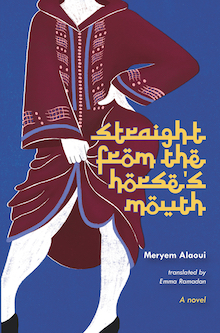
Other Press, 2020
The title of Straight from the Horse’s Mouth, by Moroccan writer Meryem Alaoui, translated by Emma Ramadan, immediately hints at the novel’s central preoccupation: the ambiguous value of firsthand testimony from a witness not granted the privileges of a full humanity. What sort of creature is speaking, and what makes her account compelling? The novel’s narrator, Jmiaa, a sex worker in Casablanca, offers a boldly unambiguous answer. She has a story to tell, and she intends to tell it her way. “When I unleash my tongue,” Jmiaa says, “it takes off like a high-speed train.”
As the novel begins, Jmiaa is living with her young daughter in a room they share with a roommate, Hamila. The two women work for a man named Houcine, and their lives unfold in a series of checkered days in which absurd and violent episodes alternate with bouts of glazed passivity. Between appointments, Hamila immerses herself in the Quran while Jmiaa sits by the window “watching the people come and go while I eat pepitas.”
A sharply unsparing observer, Jmiaa nevertheless laces her reportage with details that evoke a sweeter world. When her friend Rabia gets into a fight with an overbearing neighbor, Jmiaa observes that “her right hand was on her hip and her forehead closed the gap with Rabia’s, like the Eid sheep when you try to catch it.” In these moments, fast-talking Jmiaa zaps the reader with her sheer vitality. She may be stuck in a hopeless situation, but she’s still interpreting her experiences, making sense of them.
Jmiaa never expected to be a sex worker in Casablanca. She grew up sheltered by her protective parents and at odds with her overbearing mother. To escape her stultifying home, she marries an unsuitable man. Her family abandons her; her husband sinks into a drug addiction. When they burn through their cash, he secretly conveys Jmiaa to his associates, who pay him to rape her. It is a short step from this terrible betrayal to her new life in Casablanca, but at least in Casablanca she is not married to her pimp.
Jmiaa is capable of seeing herself in the same degraded terms the world does, but she sees other things, too — absurdity, beauty. During a police raid, Jmiaa and her friends hide behind a row of parked cars and trash cans. “To the outside observer,” Jmiaa reflects, “it must look pretty funny. All of us crouched down, asses squeezed in djellabas clinging to us. Just our heads poking out … like the flowers in the bouquets of old Haj, the market florist.” Every now and then, she lets slip a bitingly funny remark, a reminder that she is stronger than her circumstances. “Today I’m feeling chatty. But normally I don’t go into details. I simply say that my name is Jmiaa, that I’m thirty-four years old, that I have a daughter, and that to live, I use what I’ve got.”
A talking horse is a creature from a fairy tale; a real horse is, first of all, a beast of burden. Jmiaa also carries things, mainly for her clients, who relieve their self-loathing by making her the object of it. Jmiaa understands the role she plays in a client’s sexual fantasy: “He sees a crowd cheering for him, his hands whip you like the air whipped up while he’s racing.” But “once he’s ejected his sticky glory into you, the illusion transforms into hatred. So he hits you, because he is only himself.” With this insight she inverts the terms of the encounter, devaluing those who devalue her. Taking symbolic control isn’t not much, but it helps her survive. “In the end, you don’t give a shit about them,” she says, “their misery and their grime. Because you know that’s just how it is. And that on this earth, everyone has their lot. And so, in the shitty grab bag of fate, I feel simply blessed when I get a quick one.”
Resilient as she is, Jmiaa urgently needs a way out. It arrives in the form of a Dutch filmmaker, whom Jmiaa dubs Horse Mouth. Wanting to enhance an unremarkable film-in-progress with Moroccan atmospherics, she casts Jmiaa in a major role. Benevolent but oblivious, Horse Mouth bumbles around Jmiaa’s world. One day, a woman named Mbarka, whom everyone except Horse Mouth knows to be a troublemaker, shows up uninvited on the set. The police arrive and rough her up, which gets the attention of Horse Mouth. Gripped by good intentions and a dire lack of local information, Horse Mouth intervenes in all the wrong ways. Jmiaa: “Horse Mouth has jumped out of her seat, she’s running toward the cop. Fuck, what is her problem?” Fortunately the crisis is averted: Mbarka is allowed in, offered a seat and a soda. Jmiaa resents this outcome, knowing the cops are just putting on a show for the sake of public relations. “Let that crazy woman live it up while she still can,” Jmiaa concludes. “Because those cops over there, trust me, they’ll be nice and calm until the Dutch pack up their circus, and then they’ll make her spit back up that Fanta she just drank.”
I won’t spoil the ending, except to say that it’s a very happy one. If this fairy-tale conclusion isn’t wholly convincing, it is certainly everything readers will want for Jmiaa. Toward the end, the director cries, Action! “Horse Mouth has spoken,” Jmiaa exults. “Now it’s my turn.”
+++
+
+